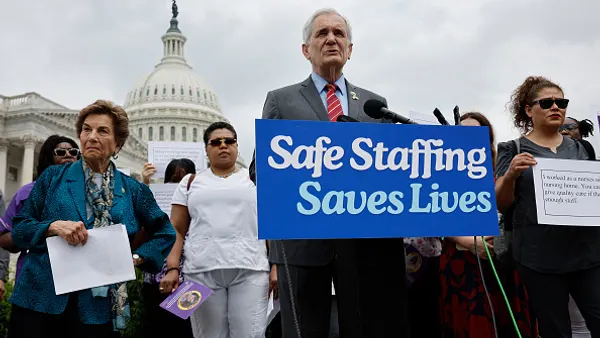Amid faster-than-expected election results, workers across the country may be grappling with unusually high stress that spills into their work lives.
And the workers likely to be dealing with these outcomes are the nation’s already stressed and burned out managers, Rachel Marcuse, chief operating officer at ReadySet, a consulting firm focused on culture building, told HR Dive.
“Managers really are the front-line people who are going to be dealing with the brunt of this,” she said, including the resultant loss of engagement sure to take place this week.
While workers this year have indicated in multiple surveys that they are not interested in talking politics at work, the reality is that this high-stakes race will likely invite conversation — and no, the answer is not to ban political chatter, Marcuse (as well as attorneys previously speaking on a webinar) said.
“People have always been talking about politics at work, even if it is historically a no-no,” Marcuse added.
Instead, managers can be trained not only to handle this event but other hard conversations that more commonly spring up in the workplace, Marcuse said. This ability to “communicate across difference” invokes trust and honesty and allows managers to have “conversations around hard things that are going to really serve us long term,” she noted.
Below are three strategies employers can implement to help keep tensions low at work this week and beyond.
1. Give managers scripts — and emphasize an open door
HR professionals can offer managers scripts for how to approach troubled workers, Marcuse said.
Sometimes this can be as simple as a list of questions to ask, including “I know there is a lot going on. How are you doing?”
Managers should also make it clear that they care about the answer — and that they are merely inviting conversation, not pushing it, Marcuse said. “Open the door,” she said. “Allow the employees to decide if they want to walk through or not.”
Leaders can also be clear about resources that are available should employees want to take advantage of them, such as EAPs and employee resource groups.
“It always feels cliche but helping people feel heard is one of the most important tools to use here,” Marcuse said.
2. Be clear with expectations and boundaries
HR can also help enable managers — who may already be busy with other expectations — to set boundaries. “We can’t expect our managers to be therapists,” Marcuse said.
Make sure managers have channels they can reach if they, too, are stressed out. Peer groups and peer support as well as ERGs can be hugely helpful for that audience, Marcuse said.
But should a workplace disagreement require direct intervention by a manager, accountability and support “are not mutually exclusive,” Marcuse said. Start by listening, she added, and then tie the conversation back to organizational values. Managers should also feel enabled to take action if any accountability needs to happen.
“This is a time when we need to be really clear about expectations and that we are training managers to be clear with how those expectations manifest in terms of behavior,” Marcuse said.
3. Think structurally about who might be most affected
Organizations should be prepared to support groups of people most affected by the results, Marcuse said.
Political violence, racist or transphobic language, and other such potential disruptions could easily spike ongoing tension and stress in the workplace. Employers need to keep “those most impacted top of mind as we’re making these decisions about policy or expectations,” she said.
But realistically, expect this entire week to be a little slow, Marcuse said; “We’re going to have to give people slack this week.”














